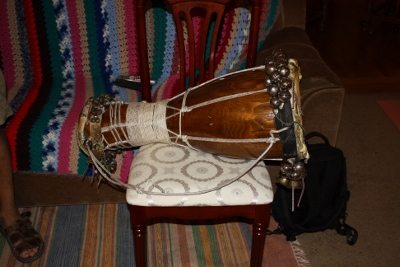
The 1970s salsa scene of New York headed up by the great bands of Tito Puente, Eddie Palmieri, Ray Barreto, and the Fania Allstars were in direct dialogue with the Latin Rock scene in the San Francisco Bay Area that featured groups like Malo, Azteca, and of course Santana. Together these groups contributed to an incredible soundtrack that characterized the social movements of the Black, Chicano, and Puerto Rican communities throughout our nation. Songs such as Black Magic Woman, Justicia, Pablo Pueblo, and Peace Everybody illuminated the sentiments from below that communities of color were feeling. The polycultural nature of the groups in both the West and East coast not only provided new styles of music to be heard but also brought old musical traditions to the forefront. Rumba, plena, bomba, son, boleros, blues, gospel, and religious drumming again became part of people’s everyday acts. This exposure to new and old music informed a new generation of musicians in a very special manner.
ACTA’s Apprenticeship Program master artist Harold Muñiz is one of these musicians. [view:article_slideshow] Well known for his participation in the 1980s San Francisco salsa scene, Muñiz worked with the exciting group Batáchanga, along with musicians such as Michael Spiro, John Santos, John Calloway, Rebeca Mauleon, and Athony Blea. During his training as a rumbero and salsero, he also developed skills as a batá drummer with masters John Santos, Marcus Gordon, Francisco Aguabella, Regino Jimenez, and Alfredo “Coyude” Vedeax. He was initiated to Ilu Aña (sacred drum), in which he went through a ceremony of the being presented to the drums—”washing of hands”—so he can touch and play “fundamental” drums, or rather the sacred batá drums that have been blessed for ceremony. When this “San FraRican” (Puerto Rican from San Francisco) started playing batá there were only two sets of fundamental drums in the United States. Muñiz explains that there are now probably more than 25 sets throughout the United States. He has since become a master musician for performance and concert settings utilizing the aberinkula, secular drums, and is a sought out drummer for bembes (ceremony and rituals). Muñiz is also a master drum maker who has learned to carve out the hourglass double-headed drums known as the, Iyá, Itótele, and Okónkolo. He now works in the Sacramento area with his latin jazz ensemble La Descarga! and Ebo Okokán, a Cuban folkloric music and dance troupe, where he is joined by his 2011 Apprenticeship Program apprentices Beatriz Muñiz, John Webster, and Dominic Garcia.
Muñiz has been working with his apprentices for various years attending to the repertoire of the Odo Seco, the series of rhythmic performance without vocals. Since then Harold Muñiz’s partner Beatriz Muñiz, a fine percussionist and vocalist in her own right, has taken the challenge to become a akpuon, a position of lead vocals within the ensemble. For Muñiz and his apprentices, the Apprenticehsip Program has provided the opportunity to focus much more on learning the different repertoires for the different Orishas, the order of songs, and pay much more attention to the vocal aspect of ceremony.
